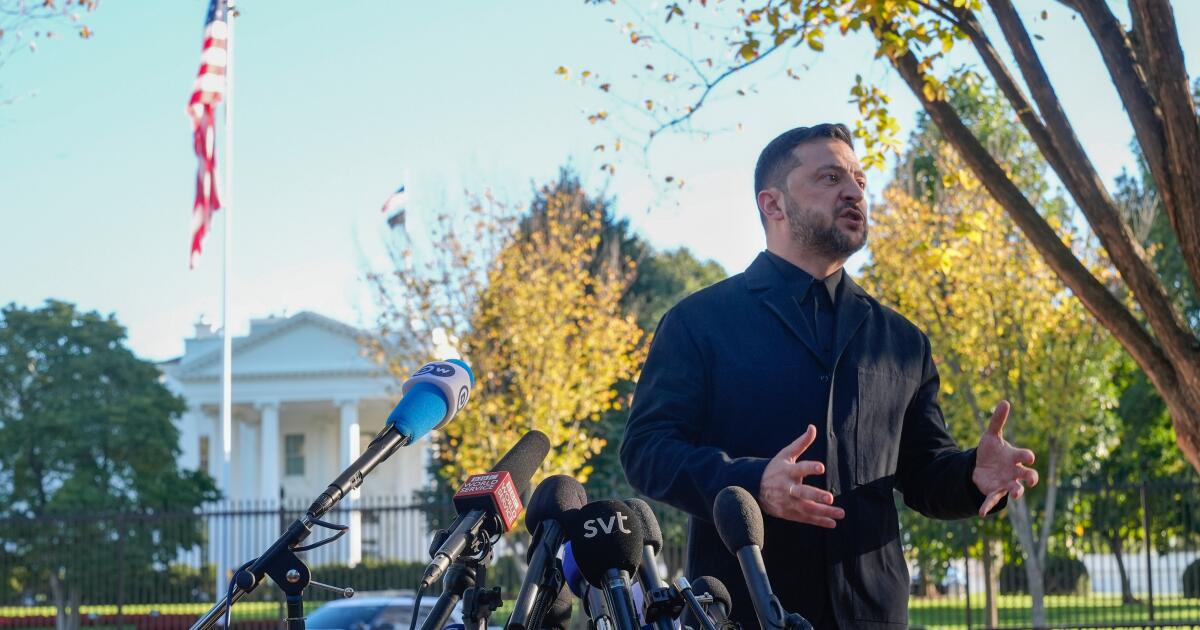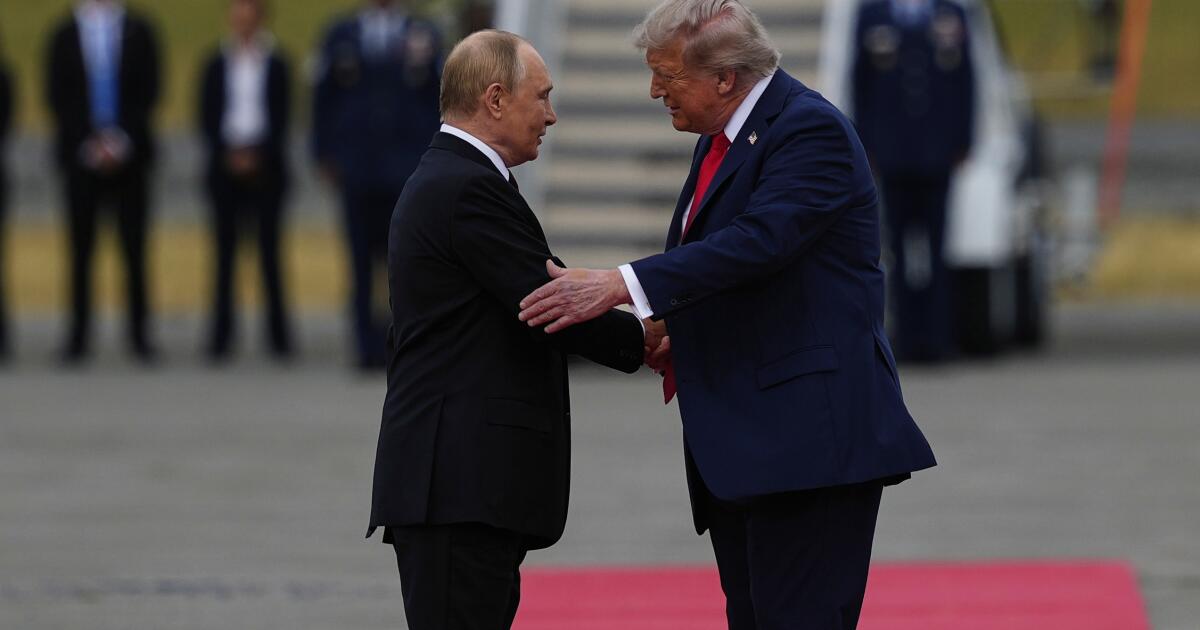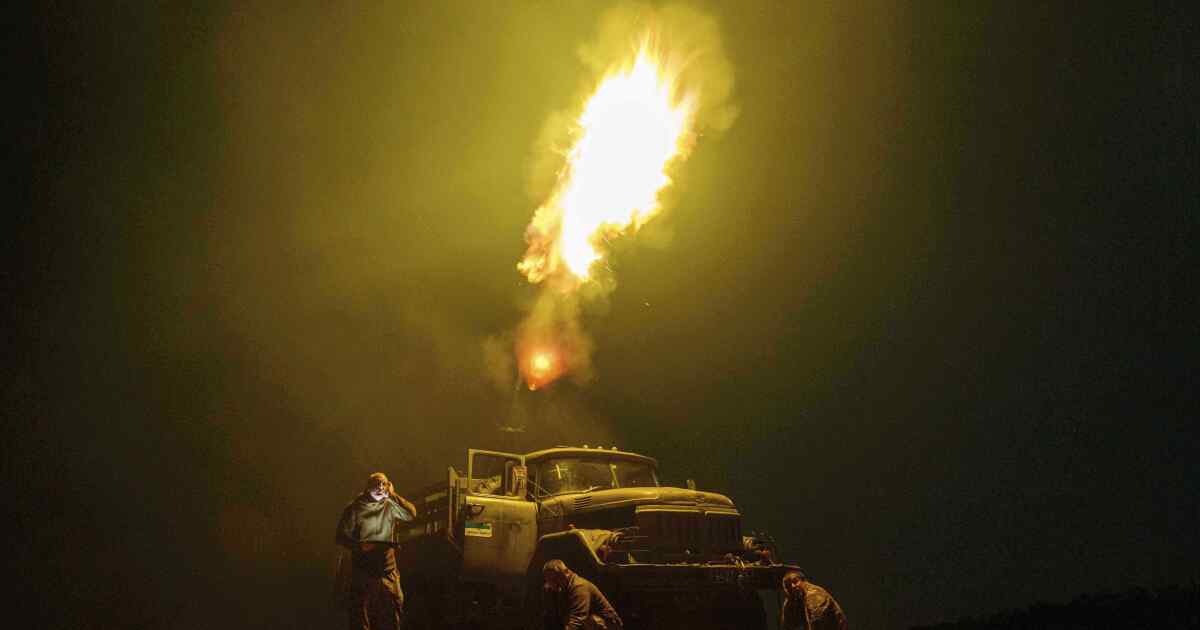We’ve read quite a bit about President Trump’s “hot mic” comment, during a meeting with European leaders about the Russian war against Ukraine, that Vladimir Putin “wants to make a deal for me, as crazy as it sounds.”
Pundits debated whether this was an embarrassment for Trump; they wondered why he would say such an important thing in a whisper to French President Emmanuel Macron — as if Trump’s verbal goulash were something new. Headlines were full of the word “deal” for a while, including three days later, when they were reporting that Trump said Putin might not want “to make a deal.” And, of course, there is no deal.
The press coverage of the meeting in Alaska said there were lots of “constructive” conversations. Putin spoke about “neighborly” talks and the “constructive atmosphere of mutual respect” in his conversations with Trump. There were reports about agreements “in principle” on various things under discussion, although there were no details about what they might be.
I covered more than a few superpower summits, first as a reporter for the Associated Press and later for the New York Times. Although that was more than 30 years ago, the smoke and mirrors nonsense usually produced by meetings like these has not changed. Verbal gas is abundant and facts almost nonexistent. Trump’s comments were worth about as much as anything else he has said on the subject, which is almost nothing. And yet, they were reported and parsed endlessly as if they had the same meaning as other presidents’ words had in the past.
I had a powerful sense of deja vu from a five-day trip to Afghanistan in January 1987. The Kremlin had finally agreed to let a group of Western journalists visit Kabul and Jalalabad to witness the “cease-fire” that had been announced a few days before we arrived. The visit was billed as an Afghan government tour, which nobody — especially the Afghan government — believed.
We saw no fighting, although we could see artillery fire in the hills at night. Some of the “specials,” as we wire service correspondents called the major media then, reported that we were fired on. We were not.
Mostly, we shopped for rugs and drank cold Heinekens, which were unavailable in Moscow but mysteriously well stocked at the Intercontinental Hotel in Kabul. We were ushered to various peace and unity events between the Afghan and Russian peoples and toured the huge Soviet military camps just outside Kabul with a U.S. official (allegedly a diplomat from the Embassy, but we knew from experience that this person was from the Central Intelligence Agency).
On Jan. 19, we were taken (each reporter in an individual government car with a minder) to a news conference by Mohammad Najib, the Afghan leader whose name had been Najibullah until he changed it to make it sound less religious for his Bolshevik friends. Najib said that Afghanistan and the Soviet Union had agreed “in principle” on a “timetable for withdrawal” of Soviet occupation forces.
At that point, the Reuters correspondent, who was fairly new to Moscow still, bolted from the room and raced back to our hotel, where there was one Telex machine for us all to send our stories back to Moscow. He filed a bulletin on the announcement. When the rest of us made our leisurely return, we were greeted with messages from our home offices demanding to know about the big deal to end the war in Afghanistan.
We wrote our stories, which were about a business-as-usual press conference that yielded no real news. We each appended a message to explain why the Reuters report was just plain wrong. Talk of Soviet withdrawal was common, and always wrong. The very idea that the puppet government in Kabul had something to say about it or was a party to any serious discussions about ending the war was absurd. The most pithy comment came from the Agence France-Presse reporter, who told her editors that the Reuters story was “merde.” The Soviet military did not withdraw until February 1989, more than two years later, following its own schedule.
Much of the recent coverage about Russia and Ukraine reminds me of that Afghan news flash in 1987. The Kremlin has never been, was not then and is not now interested in negotiation or compromise. Under Soviet communism and under Putin, diplomacy is a zero-sum game whose only goal is to restore Russian hegemony over Eastern Europe. And yet, for some reason, the American media and the country’s diplomats seem as oblivious today as they always were. After the summit, they announced breathlessly that there was no peace deal out of the summit, although they all knew going in that there was no deal on the table and there never was going to be one.
But of course Putin wants a “deal” on Ukraine. It’s the same deal he has wanted since he violated international law (not for the first time) and invaded Ukraine on Feb. 24, 2022. He wants to redraw the boundaries of Ukraine to give him even more territory than he has already seized, and he wants to be sure Ukraine remains out of NATO and under Moscow’s military thumb as he has done with other former Soviet regions, like Georgia, which he invaded in 2008 as soon as the country dared to suggest it might be interested in NATO membership. His latest nonsense was to demand that Russia be part of any postwar security arrangements. He wants the NATO allies to stop treating him like the war criminal that he is and to be seen as an equal actor on the international stage with NATO and especially the United States.
That he got, in abundance, from Trump in Alaska, starting with the location. Trump invited Putin to the United States during a period of travel bans to and from Russia, immediately giving the Russian dictator a huge PR win. It also, conveniently, put him in the only NATO country where he is not wanted on charges of crimes against humanity.
As for peace talks, check the headlines from Ukraine before, during and after the Alaska summit: The Russians have stepped up their killing and destruction in Ukraine with new ferocity and have been grabbing as much land in eastern Ukraine as they can. Every square inch of that land — and more the Kremlin has not yet occupied — will be part of any “deal” that Putin will accept. Trump himself has been talking about “land swaps” (as he has from the start of the war, by the way) — a nonsensical idea when you consider the land Ukraine holds is its sovereign territory and the land Russian holds was stolen.
The brilliant M. Gessen, perhaps the leading authority on dictatorship, published an essay in the New York Review, “Autocracy: Rules for Survival,” shortly after the 2016 election. “Rule #2: Do not be taken in by small signs of normality,” they wrote.
A U.S. president and a Russian leader sitting down to talk and emerging with bluster about progress seems normal enough, perhaps encouraging when American-Russian relations have been at a historic low. Just remember that coming from these two men, the comments signify nothing — or, worse, make us wonder what Trump has given away to Putin with his talk of land swaps.
Andrew Rosenthal, a former reporter, editor and columnist, was Moscow bureau chief for the Associated Press and Washington editor and later editorial page editor for the New York Times.


